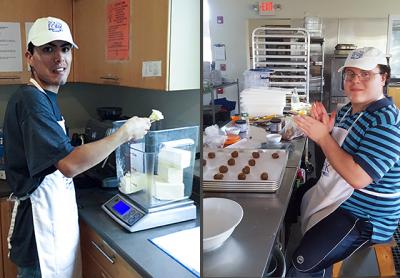Creating a Community in a Kitchen

Shirley Ruch is a licensed Sag Harbor speech and language therapist and family coach who has always loved to bake. While there is nothing unusual about that, starting and managing South Fork Bakery while maintaining a private practice is another story. Especially a bakery that within five months of its launch in May had its products in 22 stores on the East End.
However, the road from therapist to entrepreneur is not as unlikely as it might at first seem. Ms. Ruch has specialized for 20 years in working with children and families affected by autism spectrum disorders and, having equipped her office with a small kitchen, has long used cooking and baking therapeutically.
“There are a lot of benefits to cooking,” she said, “among them following directions, auditory processing, the cooperativeness of it, working together on recipes. In a lot of families I work with, the kids are now in their 20s and do not have a lot of opportunities for meaningful employment. It just came to me one day that baking could be a great thing for them to do for work.”
She took the idea to a number of families she had worked with who had children in that age range, and they all supported it enthusiastically. “So we decided to go forward, and I did, with a lot of sweat equity” and seed money from herself and her husband.
She looked at a number of kitchens before deciding the spacious facility at the Hayground School in Bridgehampton would work best. “Hayground has been very generous. Space-wise it allows us to really divide it up into stations for baking and packaging. Everything is done in the kitchen.”
They have access to the kitchen after 4:30 p.m. on Tuesdays and Wednesdays. While the number of workers varies according to the season, the average is 12. Most of them work one day a week, some for two hours, some longer, and several put in two days.
“Tuesday night is usually mixing and baking night. Wednesday is baking, with dough mixed the night before, and then packing. The kids do all the jobs.” Some of them, accompanied by job coaches, make deliveries. One young woman from Southampton has secured accounts for the bakery, while several other employees work in Ms. Ruch’s office doing business analysis and monitoring sales.
“I have some kids who, if you saw them in the community, would seem pretty impaired. One boy does every recipe perfectly. He went to BOCES for culinary training, and he has wanted to be a baker since he was 6 years old. I think he would love to make it a career.”
Ms. Ruch said that many of the kids are disenfranchised. “I see them working at jobs in the community, but it’s not always a very integrated work situation. They’re often stocking or off by themselves. The bakery has created more of a working community than I ever imagined. The kids are starting to see each other outside of the bakery. One mother told me she could count on one hand the number of times her 21-year-old son has been called up to do something. Now there’s a boy who’s calling him, and they hang out. It’s unheard of.”
Ms. Ruch spoke to Kathleen King of Tate’s Bake Shop at the beginning of her undertaking. “She gave me some wonderful advice, including to keep it simple, start with a couple of recipes, and don’t try to do too much.” She started with four basic cookies — gingersnaps, chocolate chunkies, blondies, and oatmeal raisin.
While the bakery participated in four farmers markets last summer — Springs, Hampton Bays, Sag Harbor, and Hayground — and sells from its website, the business is mostly wholesale.
“I approached a lot of people I know in the community who had businesses, and they were very gracious. They took our product and really marketed it, giving out free samples. Serene Green was wonderful, and Schiavoni’s I.G.A. has been carrying them from the very beginning.”
Readers eager to sample the bakery’s cookies will have to wait until mid-March. The operation doesn’t have enough year-round wholesale accounts to keep going throughout the year.
“We hope that will change,” Ms. Ruch said. “These couple of months off will give me time to evaluate what worked and what didn’t and how to make it sustainable.”
